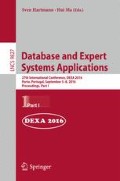Abstract
This paper presents an idea of a creative expert system. It is based on inference and machine learning integration. Execution of learning algorithm is automatic because it is formalized as applying a complex inference rule. Firing such a rule generates intrinsically new knowledge: rules are learned from training data, which consists of facts stored already in the knowledge base. This new knowledge may be used in the same inference chain to derive a decision. Complex rules may also represent other procedural activities, like searching databases. Such a solution makes the reasoning process more creative and allows to continue reasoning in cases when the knowledge base does not have appropriate knowledge explicit encoded. In the paper appropriate model and inference algorithm are proposed. The idea is tested on a decision support system in a casting domain.
Access this chapter
Tax calculation will be finalised at checkout
Purchases are for personal use only
Notes
- 1.
A rake is a tool used in sewage-treatment plants. Its main task is to mix organic materials such as straw, grass, hay, etc. with semi-liquid material obtained from the municipal waste-water treatment after suitable processing, and with soil and refining additives to obtain mineral fertilizer used in agriculture.
References
Szczepaniak, P., Kacprzyk, J., Niewiadomski, A.: Advances in Web Intelligence. LNCS, vol. 3528. Springer, Heidelberg (2005)
Sniezynski, B.: Integration of inference and machine learning as a tool for creative reasoning. In: AAAI Fall Symposium Series, North America, September 2014
Alkharouf, N.W., Michalski, R.S.: Multistrategy task-adaptive learning using dynamically interlaced hierarchies. In: Michalski, R.S., Wnek, J. (eds.) Proceedings of the Third International Workshop on Multistrategy Learning (1996)
Althoff, K., Bach, K., Deutch, J., Hanft, A., Manz, J., Muller, T., Newo, R., Reichle, M., Schaaf, M., Weis, K.: Collaborative multi-expert-systems realizing knowledge-lines with case factories and distributed learning systems. In: Proceedings of the 3rd Workshop on Knowledge Engineering and Software Engineering (2007)
Boon Toh, L., Ho Chung, L., Ah Hwee, T., Hoon Heng, T.: Connectionist expert system with adaptive learning capability. IEEE Trans. Knowl. Data Eng. 3(2), 200–207 (1991)
Collins, A., Michalski, R.S.: The logic of plausible reasoning: a core theory. Cogn. Sci. 13, 1–49 (1989)
Drezewski, R., Sepielak, J., Filipkowski, W.: The application of social network analysis algorithms in a system supporting money laundering detection. Inf. Sci. 295, 18–32 (2015)
Gabbay, D.M.: LDS - Labeled Deductive Systems. Oxford University Press, Oxford (1991)
Hart, P., Nilsson, N.J., Raphael, B.: A formal basis for the heuristic determination of minimum cost path. IEEE Trans. Syst. Sci. Cybern. 4(2), 100–107 (1968)
Legień, G., Śnieżyński, B., Wilk-Kołodziejczyk, D., Kluska-Nawarecka, S., Nawarecki, E., Jaśkowiec, K.: Expert system with web interface based on logic of plausible reasoning. In: Chen, Q., Hameurlain, A., Toumani, F., Wagner, R., Decker, H. (eds.) DEXA 2015. LNCS, vol. 9262, pp. 13–20. Springer, Heidelberg (2015)
Ligeza, A.: Logical Foundations for Rule-Based Systems. Springer, Heidelberg (2006)
Michalski, R.S.: Inferential theory of learning: developing foundations for multistrategy learning. In: Michalski, R.S. (ed.) Machine Learning: A Multistrategy Approach, vol. IV. Morgan Kaufmann Publishers, Burlington (1994)
Michalski, R.S., Larson, J.: AQVAL/1 (AQ7) user’s guide and program description. Technical report 731, Department of Computer Science, University of Illinois, Urbana, June 1975
Morgan, C.G.: Autologic. Logique et Anal. 28(110–111), 257–282 (1985)
Neapolitan, R.E.: Probabilistic Reasoning In Expert Systems: Theory and Algorithms. CreateSpace Independent Publishing Platform, North Charleston (2012)
Quinlan, J.: C4.5: Programs for Machine Learning. Morgan Kaufmann, Burlington (1993)
Riley, G.: Clips - an expert system building tool. In: Proceedings of Technology 2001 Conference, San Jose, CA (1991)
Sniezynski, B.: Probabilistic label algebra for the logic of plausible reasoning. In: Kłopotek, M., et al. (eds.) Intelligent Information Systems 2002. ASC, vol. 17, pp. 267–277. Springer, Heidelberg (2002)
Sniezynski, B.: Proof searching algorithm for the logic of plausible reasoning. In: Kłopotek, M., et al. (eds.) Intelligent Information Processing and Web Mining. ASC, vol. 22, pp. 393–398. Springer, Heidelberg (2003)
Szydlo, T., Nawrocki, P., Brzoza-Woch, R., Zielinski, K.: Power aware MOM for telemetry-oriented applications using GPRS-enabled embedded devices - levee monitoring use case. In: Proceedings of the 2014 Federated Conference on Computer Science and Information Systems, vol. 2, pp. 1059–1064. IEEE, September 2014
Tran, L.P., Hancock, J.P.: An adaptive-learning expert system for maintenance diagnostics. In: Proceedings of the IEEE 1989 National Aerospace and Electronics Conference, NAECON 1989, vol. 3, pp. 1034–1039, May 1989
Wiriyacoonkasem, S., Esterline, A.C.: Adaptive learning expert systems. In: Proceedings of the IEEE Southeastcon 2000, pp. 445–448. IEEE (2000)
Zadeh, L.A.: Fuzzy sets. Inf. Control 8, 338–353 (1965)
Acknowledgments
The research reported in the paper was supported by the grant of The National Centre for Research and Development (LIDER/028/593/L-4/12/NCBR /2013) and by the Polish Ministry of Science and Higher Education under AGH University of Science and Technology Grant 11.11.230.124.
Author information
Authors and Affiliations
Corresponding author
Editor information
Editors and Affiliations
Rights and permissions
Copyright information
© 2016 Springer International Publishing Switzerland
About this paper
Cite this paper
Sniezynski, B., Legien, G., Wilk-Kołodziejczyk, D., Kluska-Nawarecka, S., Nawarecki, E., Jaśkowiec, K. (2016). Creative Expert System: Result of Inference and Machine Learning Integration. In: Hartmann, S., Ma, H. (eds) Database and Expert Systems Applications. DEXA 2016. Lecture Notes in Computer Science(), vol 9827. Springer, Cham. https://doi.org/10.1007/978-3-319-44403-1_16
Download citation
DOI: https://doi.org/10.1007/978-3-319-44403-1_16
Published:
Publisher Name: Springer, Cham
Print ISBN: 978-3-319-44402-4
Online ISBN: 978-3-319-44403-1
eBook Packages: Computer ScienceComputer Science (R0)

